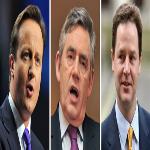15 April 2010

Photo: AFP
A combination of file images show British Leader of the opposition Conservative party David Cameron (L) Labour leader and Prime Minister Gordon Brown (C), and leader of the opposition Liberal Democrats Nick Clegg in London, 09 Apr 2010
For the first time in British history, the three main party leaders will debate one another on national television. Analysts say it is a reflection of how the British political campaigns increasingly look like the American political process.
Prime Minister Gordon Brown, the head of Britain's the Labor Party, is scheduled to debate his two main rivals, David Cameron of the Conservative Party and Nick Clegg of the Liberal Democrats, in three live, televised debates.
Political communications expert Stephen Coleman of the University of Leeds says it is a political turning point. "Britain has never had televised debates before. It has taken a great number of years to negotiate them into existence. Finally we are going to see the three main party leaders slogging it out on television in front of a mass audience," he said.
Coleman and other analysts say the debates will make campaign issues more accessible to the public. "I actually think it is a good thing because all of the evidence from America and indeed from European televised debates suggests that people learn more about the issues as a result of watching them," said Coleman.
Critics say it is a move toward personality driven politics. And Coleman says that in the upcoming debates, there is a lot at stake for the candidates.
"So, of course, there are going to be gotcha moments. Of course, there is going to be a danger of gaffes. Of course, a lot of people are going to be looking at the body language and all the rest of it. And if any of these political leaders go wrong in those terms, then they could do very badly as a result of this," he said.
But analysts say substance could triumph over appearance in these 90-minute debates.
The guidelines for the debates, including asking the studio audience not to react during the program and rules restricting the journalist moderating the forum, are being criticized by pundits and the public.
Analyst Coleman says this is the debates' biggest problem. "It seems to me that what has happened in 2010, is that Britain has adopted an American style democratic model. But they have actually employed a Soviet-style format in order to run it," he said.
Political economist Dermot Hodson of London's Birkbeck University says the debates are a clear shift toward American presidential-style politics. "The term 'presidential' is important here because it is a parliamentary system, so that the idea that the leaders represent their parties in such a direct way is quite unusual in a political system where parties tend to matter," he said.
Ultimately, he says that will mean change for the British political system. "We are going to see the continuing strengthening of the executive branch of government, where the prime minister matters more and more, the Cabinet matters less and less and parliament, for all of the attention it gets, becomes somewhat of a second order player in this game," said Hodson.
Analysts say this is the closest election in Britain in decades, so television viewers might be watching not only for who wins the debates, but also for leaders who can work together in a possible coalition government.